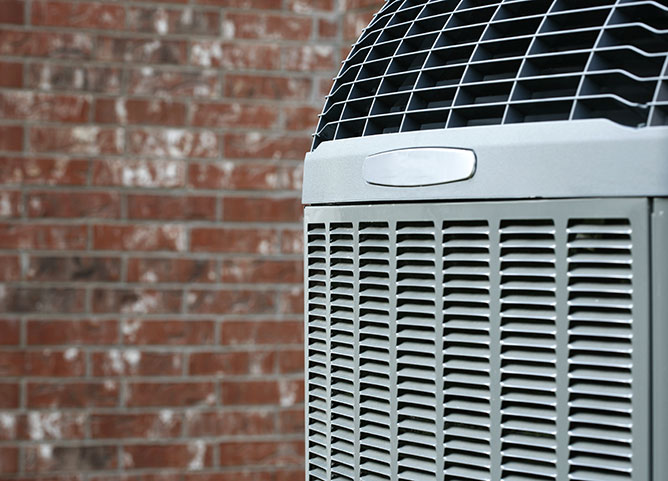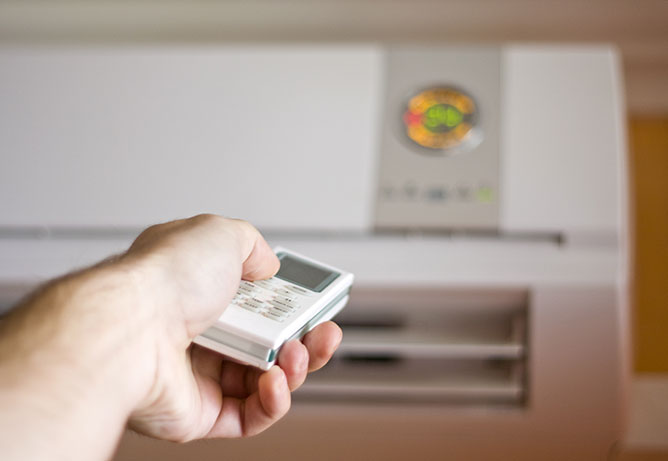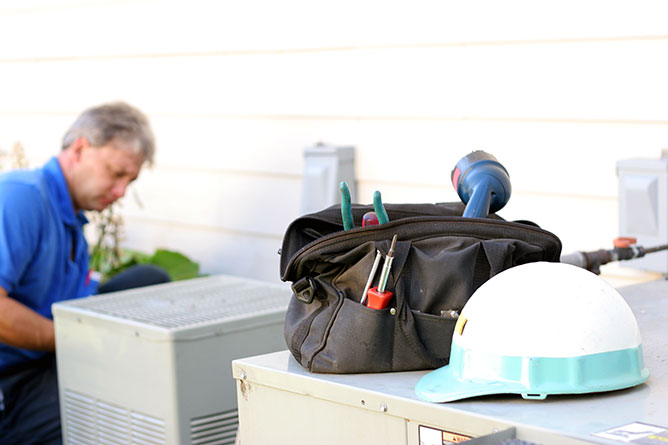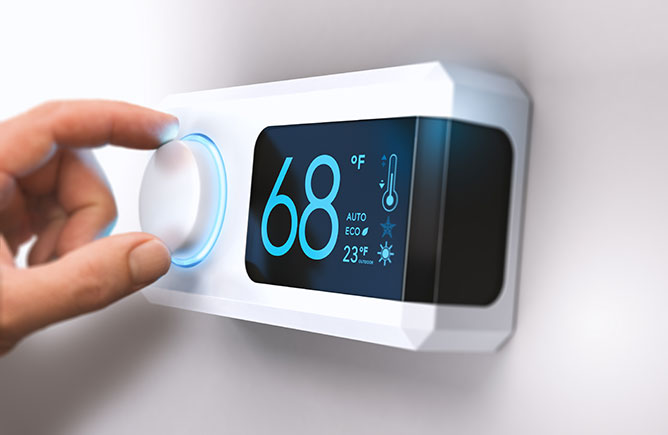COST CALCULATOR
How Much Does It Cost To Install Air Conditioning?
Find out how much your project will cost
HVAC unit replacement cost

Air conditioning is a vital part of life for most people, and few homes are built and upgraded without it today. If you live in a climate where temperatures are routinely hot in the spring and summer, you'll likely lean on your air conditioning system to keep you cool and comfortable for nearly half the year.
The cost of installing a new AC system or upgrading your old one can be a little daunting though. For people on a budget, every penny counts, making it essential to keep your AC unit cost down. You'll still need adequate cooling power though, as an AC unit that's undersized or underpowered simply won't get the job done. Even worse, it will be running around the clock to try and keep your home cool.
Use this guide to learn more about the overall AC unit cost you can expect when installing a new system or upgrading an existing one. While installation and labor costs do vary by region and even neighborhood by neighborhood, this general guide can help you get a better grasp of what to expect when it comes to your overall AC installation cost.
Cost Calculator
| Standard Services | Quantity | Low | High | ||
|---|---|---|---|---|---|
| What you can expect | |||||
| Range per unit: | $3,721.77 | $4,416.57 | |||
| Range for this type of project: | $3,722 | $4,417 | |||
| Estimate: $4,069 | |||||
Air Conditioning Installation Cost | 1 unit | $2,484 | $2,898 | ||
Cost of air conditioning unit that works with existing air-handling system. 3-ton capacity and 18 SEER heat-pump condenser cools the average home fully and evenly. Requires 240V, 25A electrical connection at installation site. Ten-year limited warranty guarantees exceptional quality. | |||||
Basic Labor for Air Conditioning Installation | 14 hours | $1,187 | $1,439 | ||
Labor costs for thorough installation under standard conditions. This will start with a full assessment of the space. The layout will be planned, appropriate equipment acquired, materials transported, and all preparation, installation and cleanup carried out. After the indoor air handler is mounted, the ducting hole will be prepared, and the unit placed. Electrical connections will be made and fully concealed, and piping connected, secured, and concealed as well. | |||||
Job Supplies for Air Conditioning Installation | 1 unit | $27 | $31 | ||
All necessary supplies for seamless installation of unit. Fittings, fasteners, and mounting hardware are included in this fee. | |||||
Equipment Allowance for Air Conditioning Installation | 1 job | $24 | $48 | ||
An additional fee that covers our overhead costs for the maintenance of heavy equipment, such as the pipe cutter and threader, tubing cutter, brazing kit, and pipe wrenches. This is assessed as a daily rental fee, while single-use equipment elements will incur separate charges. | |||||
Removal of Air Conditioning Installation Waste | 1 unit | $12 | $13 | ||
Additional fee for safe, expeditious disposal of old materials, installation waste, and all associated debris. | |||||
| Optional Services | |||||
Removal of HVAC Unit (Optional) | 1 hour | $94 | $113 | ||
Full disconnection and removal of HVAC unit, up to 200 lbs. Power, connections, and fittings will be detached, mounting hardware disconnected, and unit removed from premises for proper disposal. | |||||
$2,484 -$2,898
unit
$1,187 -$1,439
hours
$27 -$31
unit
$24 -$48
job
$12 -$13
unit
$94 -$113
hour
$3,722 - $4,417
$3,722 - $4,417
$4,069
Cost Comparison
Install air conditioning: national average cost
| cost to install air conditioning | |
| National Avg. Materials Cost per unit | $2,716.14 |
| National Avg. Cost (labor and materials) for 1 unit | $4,107.32 |
| National Cost Range (labor and materials) for 1 unit | $3,756.66 - $4,457.98 |
HVAC unit replacement cost by type
Before you can truly break down the costs and benefits of installing an AC unit you need to decide what type will work for your current project. With a variety of different AC units on the market, you have ample choices that will provide flexibility and help you meet your budget.
Below you'll find some of the most common types of air conditioning systems you can install to cool your home.

Room air conditioners
Often referred to as single-room air conditioners or window units, these are made to cool a single space effectively. Cost-effective and simple to install, almost anybody can tackle putting one of these in place in an afternoon.
Unit costs can vary from a few hundred dollars to closer to $1,000 for more powerful units designed to cool larger spaces like your living room. For open floor plan home designs, larger units may be essential. In a bedroom space, smaller, more inexpensive units may provide enough cooling power to keep you comfortable on even the hottest days.
Extra bells and whistles and improved performance can drive the price of single-room air conditioners up as well. A model that features extra-quiet operation and a remote control will usually cost more than a model with a touch-pad on the face of the unit.
Average Room Air Conditioners cost: $200 - $800
Split air conditioners
Split air conditioning systems offer more flexibility and provide more power than your average single-room unit. The main benefit of split air conditioners is that they don't require ductwork. This can keep building costs down when you're starting from the ground up.
Ductless systems also allow you to renovate or retrofit an existing home for air conditioning without the added expense of installing ductwork. This means that handy homeowners may be able to install split AC systems on their own as well. Depending on your needs, two main kinds of split AC systems can be utilized depending on your needs and budget.
Standard split systems connect a single outdoor unit to an indoor unit. This indoor can be installed in an unobtrusive space Standard split systems are often installed in an out of the way area, like above a window casing.
Multi-split systems allow you to connect multiple indoor units to one outdoor unit. This allows you to cool more rooms independently. Up to five indoor units can be connected with most multi-split systems.
With a standard split system, you'll have adequate cooling power for a single room and much more sophisticated controls than a window unit can typically provide. Multi-split systems offer more flexibility, and in smaller homes, they can cool almost every space adequately.
Average Split Air Conditioners Cost: $2,000 to $6,000
Heat pump split systems
Heat pump split systems work in a fashion that is very similar to a split air conditioner above. However, unlike a split air conditioner, these units provide both heating and cooling power much the same way a larger HVAC system would. Heat pump split systems don't need ductwork to operate however.
Heat pump-based split systems can also function in multiple rooms, and most setups allow you to have considerable control over the temperature in each space. Like a split AC system, you can install heat pump designs in areas where they won't be in your way throughout the house.
There are some concerns with heat pump systems in colder climates. While ratings vary, most users say they need supplemental systems if the temperature regularly drops below freezing. Supplemental systems like a gas furnace are most common.
Average Heat Pump Split Systems Cost: $3,500 to $8,000
Central air conditioning systems
Central air conditioner systems are considered the cream of the crop, best of the best option in most places. When the budget allows, these are typically your best bet if you're looking to cool your whole home throughout the year.
Central air conditioning systems are also serviceable and made to last, so they'll typically stay in your home much longer than AC window units. They tend to require less user maintenance as well.
Average Central Air Conditioning Cost: $2,800 to $8,000+
Keep reading below to learn more about the average new central AC unit cost for your home. We'll break down different ways you can set your budget based on the unit itself, installation costs, cost by ton and cost per square foot.
New central AC unit costs
Determining your overall air conditioning unit cost when trying to set a budget can be a little tricky. On average, homeowners spend between $2,000 and $4,000 for their air conditioning unit alone. This figure doesn't take installation and any other associated costs you may encounter into account.
In general, high-performance models that are extremely efficient tend to cost more than standard efficiency units. You can check the efficiency of a unit based on the SEER rating number provided by the manufacturer.
Standard models have a seer rating of between 13 and 15. High efficiency and very high efficiency models have a SEER rating of 15 to 18 and 18 to 21 respectively. Maximum efficiency, top-grade models typically have a SEER rating of 22 to 24.
Choosing the right AC unit brand
The name and logo on your air conditioner isn't particularly important, right? After all, you're not going to show it off to friends and family members like you might a new car. What you want is a reliable, solid unit that's properly sized and powered to fit your home.
Knowing the average price of AC unit brands can help you when you're comparison shopping or in the early stages of planning your home build or renovation. Here's a list broken down by brand based on their average unit cost, starting from most expensive to most cost-effective:
- Carrier -- $3,895 average unit cost.
- Lennox - $3,795 average unit cost.
- American Standard -- $3,656 average unit cost.
- Trane -- $3,220 average unit cost.
- HEIL -- $3,400 average unit cost.
- Amana -- $2,935 average unit cost.
- Goodman -- $2,488 average unit cost.
- York -- $2,354 average unit cost.
Note that these prices are simply averages that include both top of the line and more economic products made by these brands. SEER ratings can also vary from unit to unit. For this reason, price isn't always a one-to-one indicator of quality, power or durability, making it only one factor you'll need to consider when considering your new AC unit cost.
AC unit installation cost
Many homeowners are rightly concerned about what their total AC installation cost is going to be. While the units themselves can cost a few thousand dollars, installation typically runs between $2,500 and $4,000. A labor-intensive job that requires expert skill, a proper installation is a must, and this is work that should only be done by professionals.

Air conditioning installation cost by ton
An average air conditioning unit can cool roughly 400 square feet of your home with a single ton of cooling power. This basic guide can help you determine how much you'll need to spend and what size air conditioner you'll need to get.
For example, a 1,600 square foot home would require an AC unit with a minimum 4-ton cooling capacity for maximum efficiency. Use this 1-ton per 400 square foot formula to determine the right air conditioner for your space.
Here's a chart of average prices by ton to help you evaluate your AC unit costs now:
- 2 Ton: $2,600 to $2,800.
- 3 Ton: $2,900 to $3,100.
- 4 Ton: $3,600 to $3,800.
- 5 Ton: $3,600 to $3,800.
Note that half-ton AC models do exist, and in many cases, choosing a slightly more powerful model than you need can improve efficiency. That's because an AC model that provides just barely enough cooling capacity for your home may be put under great stress during the hottest parts of the year.
AC unit cost per square foot
Another way to break down your potential AC unit cost is to use the square footage of your home. Simply divide the number of square feet you want to cool and divide by 400, which is the amount of cooling that a one-ton capacity unit can provide. This will tell you the cooling capacity in tons that you'll need for that given area.
Here's an example with a small 1,000 square foot home:
1,000 % 400=2.5 tons. That means you'll need an AC unit with a cooling capacity of 2.5 tons or more for your space.

New AC installation costs
A new AC unit can be costly, but there's more to figuring out how much you'll need to spend than you might think. In some cases, there are hidden costs you'll need to be aware of before you plan your installation. Here are a few common things to consider when installing a new AC unit:
- Will I need to alter the construction of my home in any way to make room for an AC unit?
- Do I need a permit for the installation? Will I need to pay for an inspection to make sure the unit is up to code in my city?
- Do you live in an older home where lead paint or other potentially problematic materials may need to be dealt with before installing a new AC unit is safe?
HVAC unit replacement cost
Replacing an aging or failing AC unit with a more modern, up-to-date and efficient model can be a worthwhile investment for your home. It's also typically less expensive than installing a brand new system as long as your ductwork is up to par.
In general, your AC replacement cost can vary between about $3,000 to $6,500 or more for extremely efficient models with a very high SEER rating. Costs will be slightly higher if you have to replace other parts of your system like the air handler during your upgrade.
What about AC unit repairs?
Over time, your AC unit is likely to need repairs along with regular maintenance to keep it running in tip-top shape. Here are some of the average costs associated with home air conditioners:
- General maintenance. $75 to $300 per year if no repairs or replacement parts are needed. This includes seasonal tune ups that ensure your AC unit is working properly. Budget approximately $20 to $100 per year for replacement filters on average.
- AC compressor. $200 to $800 for parts. AC compressor costs will likely double once you include installation, bringing the total AC compressor replacement cost to between $500 and $1,500 depending on your area.
- AC capacitor. The average AC capacitor cost is between $20 and $100 depending on the AC unit you have. Installation should only take an hour or two of a qualified tech's time, bringing your whole total to anywhere from $100 to $300 in most cases.
How long do AC units last?
Air conditioning systems typically last 10 to 15 years, with complete HVAC systems providing roughly 15 to 20 years of quality performance on average. Of course, these numbers can vary based on the long-term durability of the unit you choose for your home.
Regular maintenance is also a factor when it comes to how long your AC unit is going to last. While maintenance can seem expensive at the time, your average air duct cleaning cost is far less than what you'll spend replacing a unit that didn't last as long as it should have.
Frequently asked questions (FAQs)
🥵 How often should I replace my air conditioner?
🛠 Should I repair my AC unit or buy a new one?
📅 Should I get my air conditioner serviced regularly?
🥶 How do I know how efficient an AC unit is?
Find out how much your project will cost
Popular Calculators
Top cities for this service
- Heating and Cooling Installation New York, NY
- Heating and Cooling Installation Dallas, TX
- Heating and Cooling Installation Chicago, IL
- Heating and Cooling Installation Los Angeles, CA
- Heating and Cooling Installation Atlanta, GA
- Heating and Cooling Installation Seattle, WA
- Heating and Cooling Installation Charlotte, NC
- Heating and Cooling Installation Washington, D.C.
- Heating and Cooling Installation Orlando, FL
- Heating and Cooling Installation Nashville, TN
- Heating and Cooling Installation Phoenix, AZ
- Heating and Cooling Installation San Francisco, CA
- Heating and Cooling Installation Denver, CO
- Heating and Cooling Installation Philadelphia, PA
- Heating and Cooling Installation Boston, MA
- Heating and Cooling Installation Detroit, MI
- Heating and Cooling Installation Minneapolis, MN
- Heating and Cooling Installation Tampa, FL
- Heating and Cooling Installation Indianapolis, IN
- Heating and Cooling Installation Raleigh, NC
- Heating and Cooling Installation Columbus, OH
- Heating and Cooling Installation Portland, OR
- Heating and Cooling Installation Omaha, NE
- Heating and Cooling Installation Memphis, TN
- Heating and Cooling Installation Miami, FL
- Heating and Cooling Installation St. Louis, MO
- Heating and Cooling Installation Kansas City, MO
- Heating and Cooling Installation Sacramento, CA